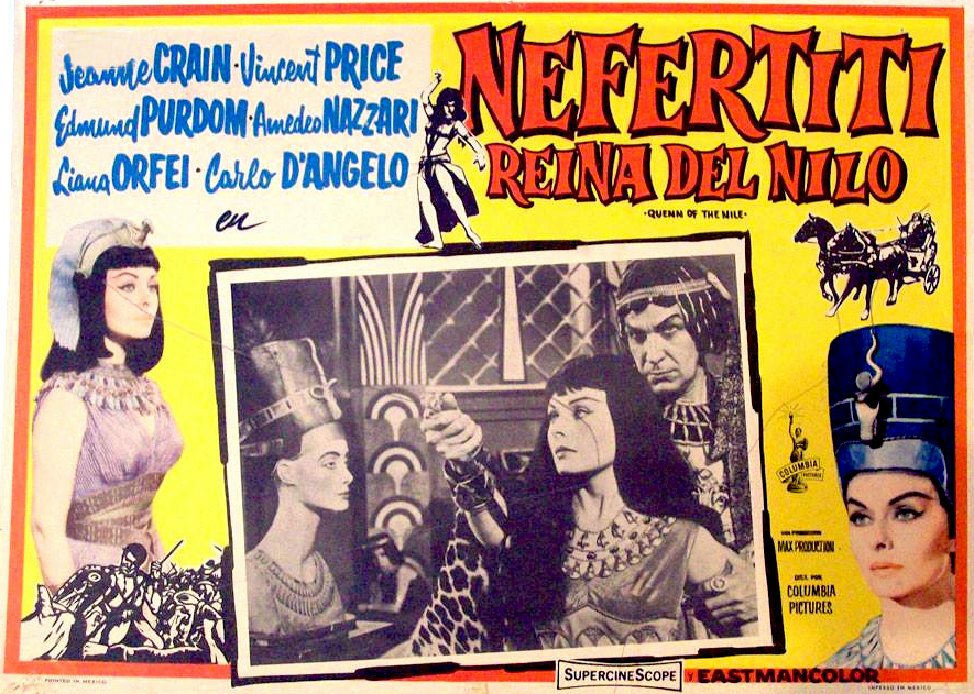
ABOUT THE MOVIE
Nefertiti, Queen of the Nile is not without its redeeming qualities. The sets are richly coloured and reasonably lavish, there are a few gems in the script,
one of the best being "the
Nile itself cannot wash away my sins", and there are three good performances; Jeanne Crain, who is the epitome of radiance; Edmund Perdum while not a great performance still has a
likeability to it; and Vincent Price who plays the diabolical
High Priest, Benakon, not his best work, but adequately evil
as the antagonist who is finally dispatched by an arrow, as
he is sacking the royal palace, in an attempt to reinstate
his religion.
The costumes did
not quite live up to what one might expect, such as with the
lavish 1963 Cleopatra. Nor the sets, and oh for CGI to fill
in the blanks. They production and direction looked somewhat
cut price. Meaning
that we never get the sense of being being transported to ancient
Egypt. The music has some nice moments but forgettable within minutes after the film ending. Apart from a couple of gems, the dialogue is embarrassingly banal, the story lacks any kind of lustre and bite and was sort of ridiculously
thin, and of the characters only the three main ones were defined well, everyone else was
padding and just there for the sake of it. In conclusion,
the film is neither good or bad, fairly entertaining if you are in
the mood for a bit of Egyptian film history, but at the end of the day little more than that.
And we are fans of the genre.
But
then, the cast align well with that of Cleopatra
and Elizabeth
Taylor, and Edmund Purdom is cut from the same cloth as
Richard Burton, though both somewhat less believable. Nevertheless,
one can imagine Walter Wanger, conjuring up his cast based
on those he saw in 'Queen of the Nile,' transposing the
themed love story from one Egyptian to another, but ramping
up the spectacle, somewhat, along with the budget and
director Joseph L. Mankiewicz, making the running with
better camera angles, and those extraordinarily lavish sets
that almost bankrupt the film company.
The
slight misnomer, is that Cleopatra is also popularly known
as the Queen of the Nile. While Neferneferuaten Nefertiti (c. 1370 – c. 1330 BC) was a queen of the 18th Dynasty of
Ancient
Egypt, the great royal wife of Pharaoh Akhenaten. Thus,
she was perhaps the earlier/earliest Queen of the Nile.
Among a host of contenders.
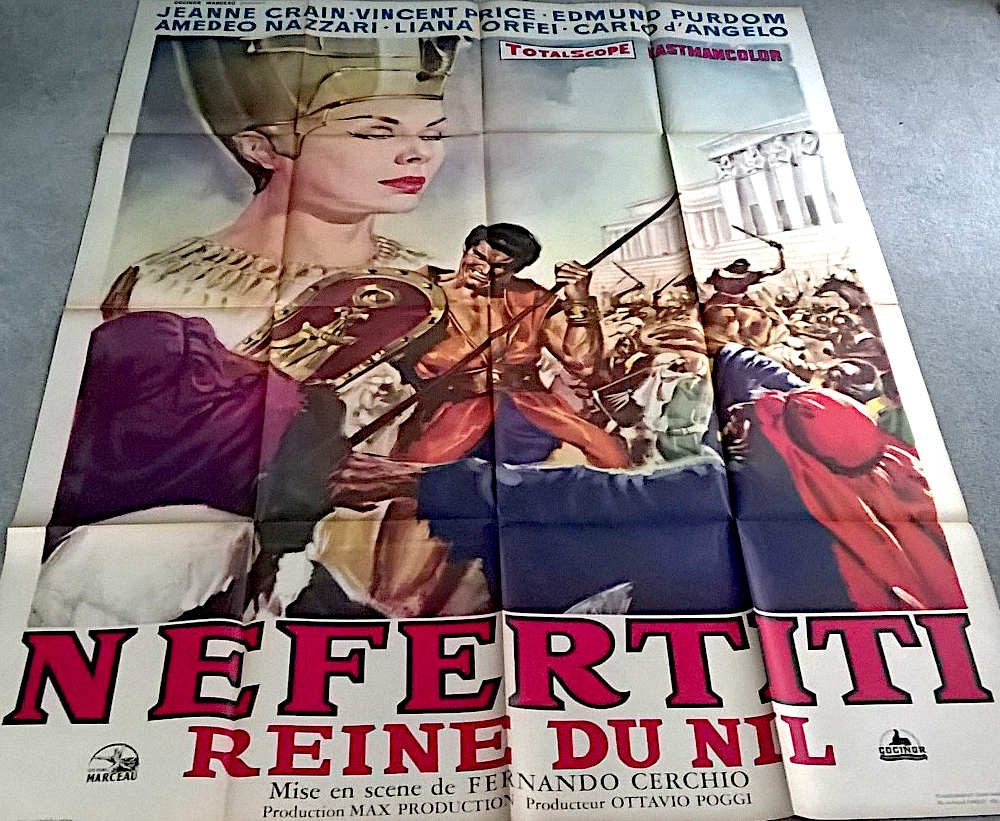
The film was submitted to the British Board of Film Censors by E. J. Fancey and passed with a "U" certificate (for all ages) on 19 April 1963. Eventual distributors S.F. managed to get the film a three week run in London's West End and it opened at the Gala Royal on 25 April 1963.
Hardly appropriately, S.F. selected German X-film Mainly for Men (1959) as the supporting feature.
Queen of the Nile did not get a general release on the major circuits in the UK, but was distributed on an optional basis to a fair number of cinemas. After disappearing for 25 years it re-surfaced on the ITV network in 1991.
CAST
& CREDITS
Directed by Fernando Cerchio
John Byrne (screenplay)
Fernando Cerchio (screenplay)
Emerico Papp (story)
Ottavio Poggi (story + screenplay)
Jeanne Crain - Nefertiti
Vincent Price - Benakon
Edmund Purdom - Tumos, Scultore
Amedeo Nazzari - Amenophis IV
Liana Orfei - Merith
Carlo D'Angelo - Seper
Alberto Farnese - Dakim
Clelia Matania - Penaba
Giulio Marchett - Meck
Piero Palermini - Nagor
Umberto Raho - Zeton, Priest
Gino Marturano - Melad (as Luigi Marturano)
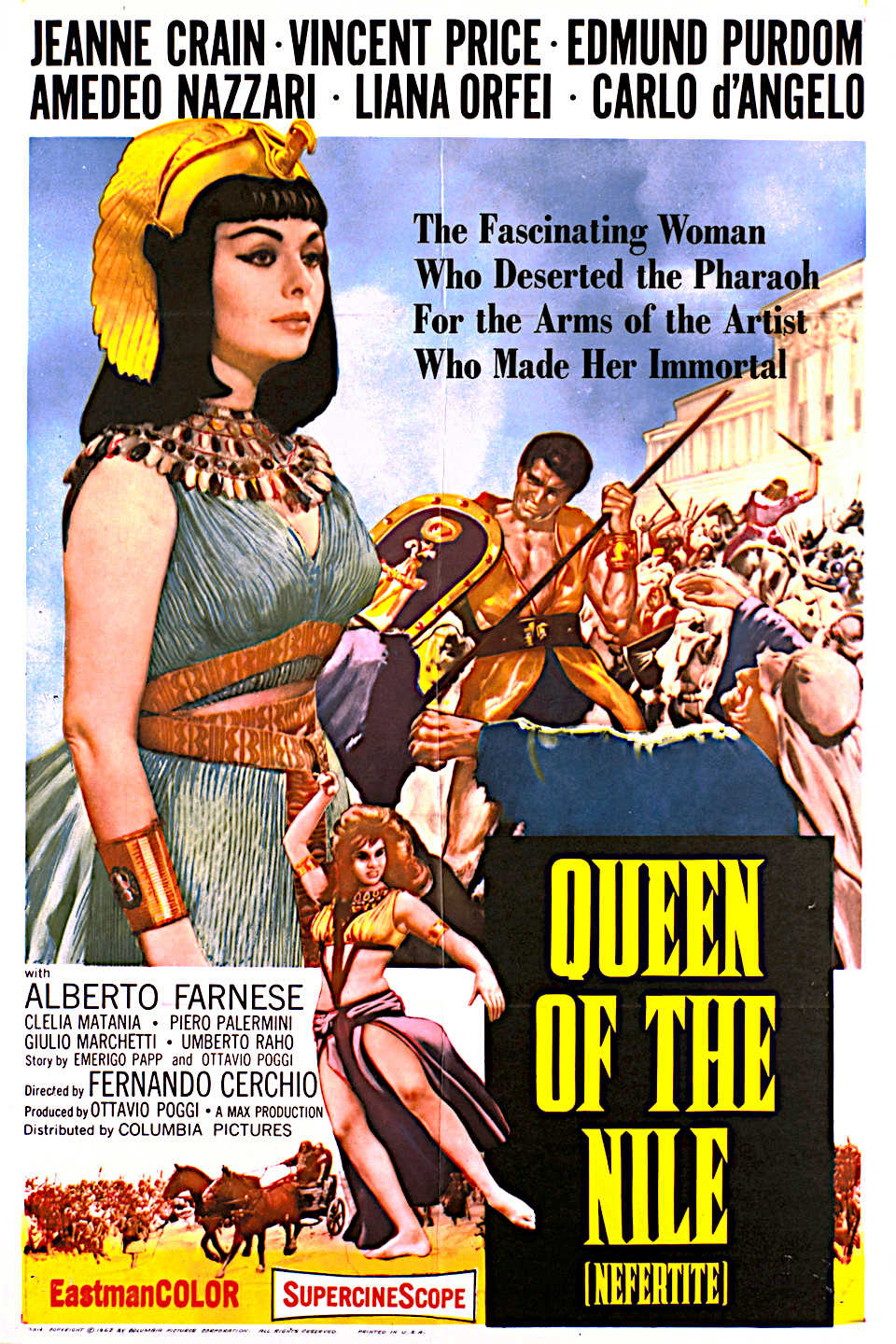
Jeanne Crain was born in Barstow, California, on May 25, 1925. The daughter of a high school English teacher and his wife, Jeanne was moved to Los Angeles not long after her birth after her father got another teaching position in that city. While in junior high school, Jeanne played the lead in a school production which set her on the path to acting.
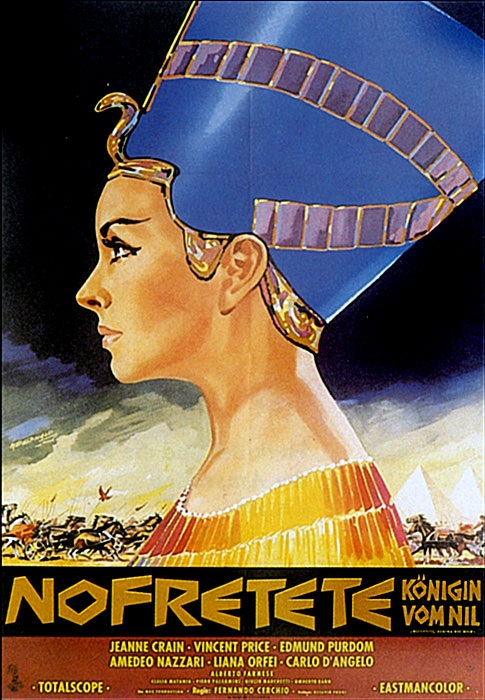
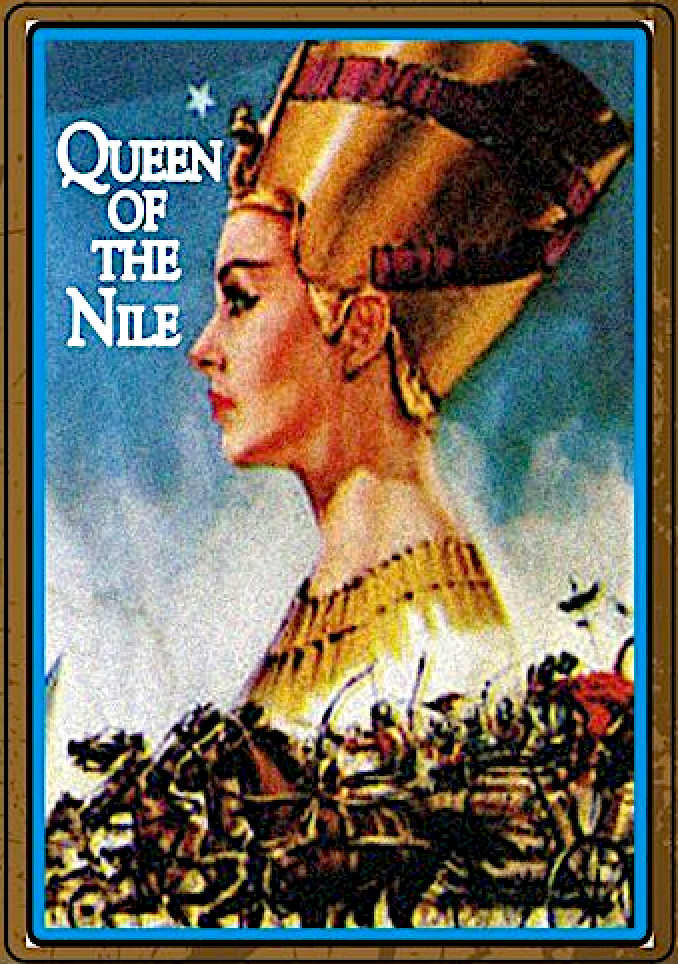
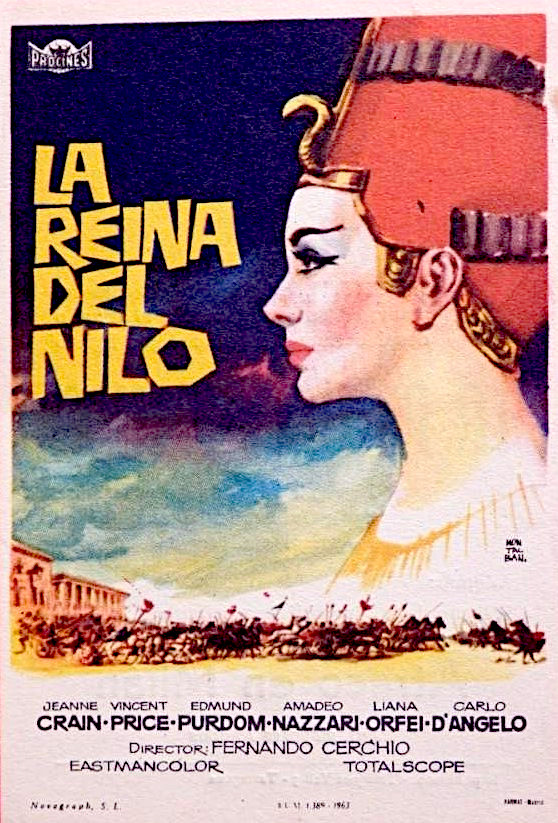
Gifted with aristocratic good-looks and a rich speaking voice, English-born thespian Edmund Purdom graced dozens of European genre films in a career that spanned over 50 years.
Born in Hertfordshire and educated in Stratton-on-the-Fosse, Purdom made his professional stage debut at age 21 and worked with the Royal Shakespeare Theatre for two years. He arrived on Broadway in 1951, acting opposite Laurence Olivier and Vivien Leigh in productions of Shakespeare's
"Antony and
Cleopatra" and Shaw's "Caesar and Cleopatra." A supporting turn in Joseph L. Mankiewicz's
Julius Caesar (1953) saw him cast in a string of lavish studio pictures as a lead, first as a last-minute replacement for Marlon Brando in The Egyptian (1954), then as the face to Mario Lanza's singing in The Student Prince (1954).
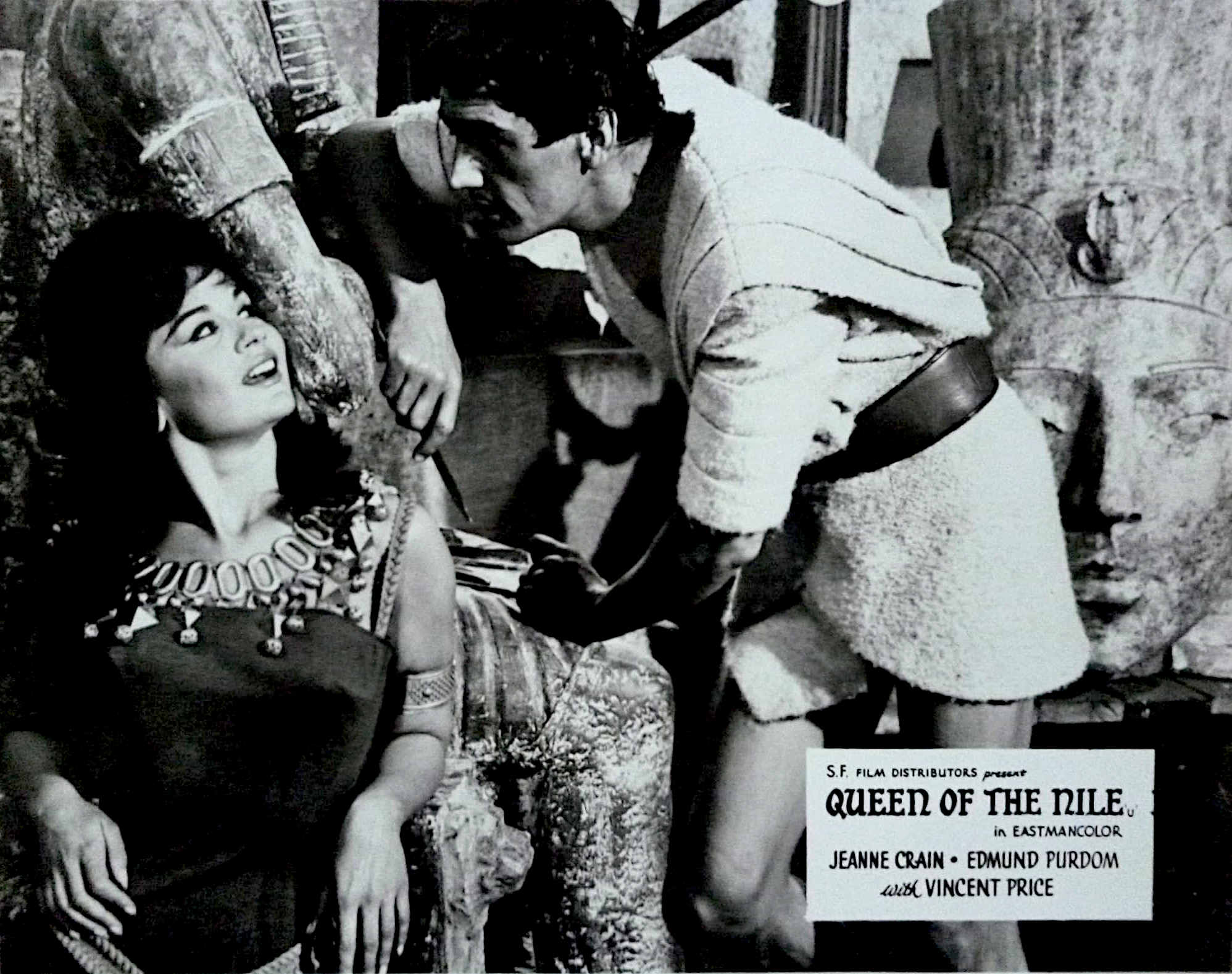
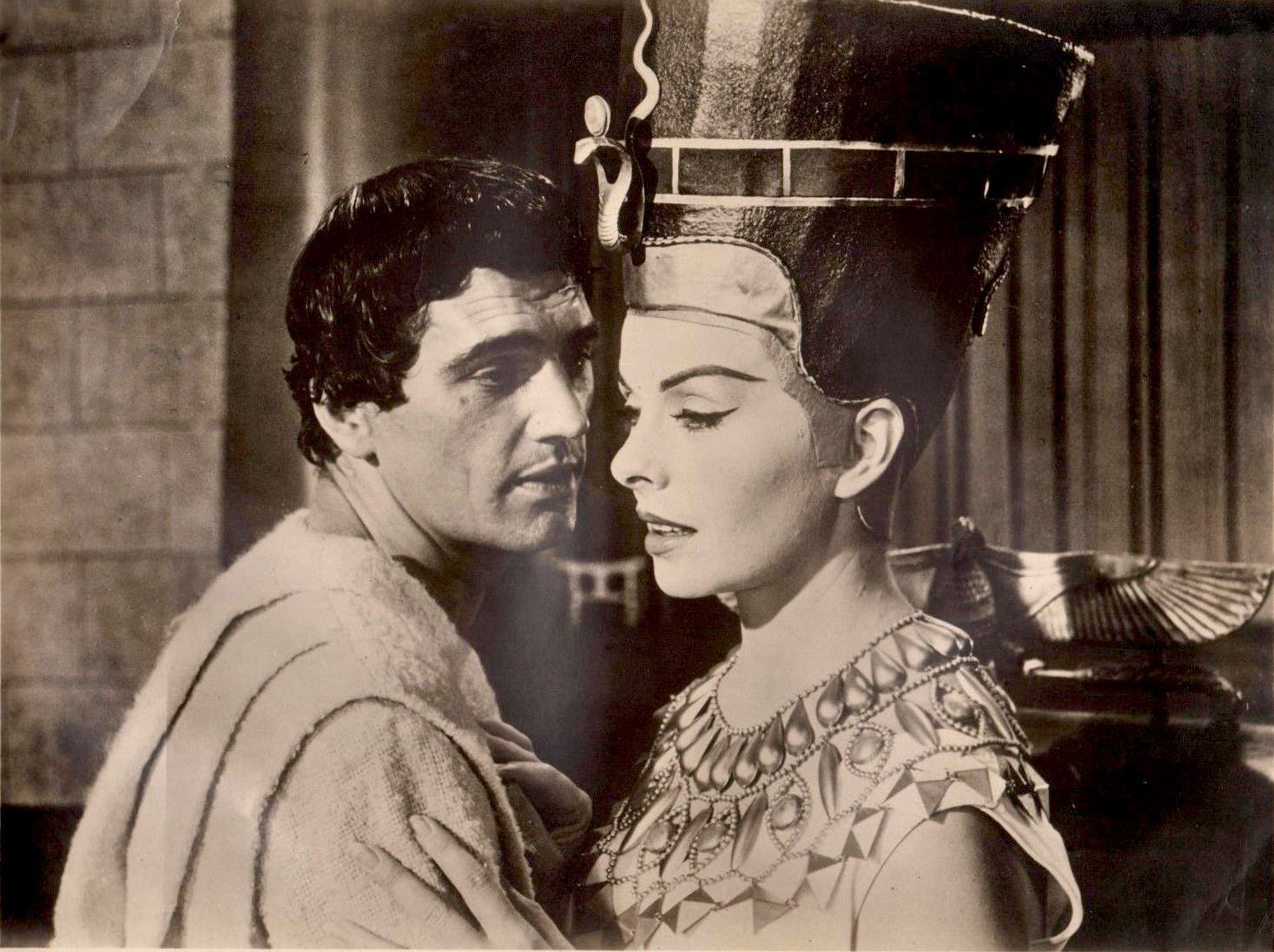
Actor, raconteur, art collector and connoisseur of haute cuisine are just some of the attributes associated with Vincent Price. He was born Vincent Leonard Price, Jr. in St. Louis, Missouri, to Marguerite Cobb "Daisy" (Wilcox) and Vincent Leonard Price, who was President of the National Candy Company. His grandfather, also named Vincent, invented Dr. Price's Baking Powder, which was tartar-based. His family was prosperous, as he said, "not rich enough to evoke envy but successful enough to demand respect." His uniquely cultivated voice and persona were the result of a well-rounded education which began when his family dispatched him on a tour of Europe's cultural centres. His secondary
education eventually culminated in a B.A. in English from Yale University and a degree in art history from London's Courtauld Institute.
Famously, his name has long been a byword for Gothic horror on screen. However, Vincent Price was, first and foremost, a man of the stage. It is where he began his career and where it ended. He faced the footlights for the first time at the Gate Theatre in London. At the age of 23, he played Prince Albert in the premiere of Arthur Schnitzler 's 'Victoria Regina' and made such an impression on producer Gilbert Miller that he launched the play on Broadway that same year (legendary actress Helen Hayes played the title role). In early 1938, he was invited to join Orson Welles 's Mercury Theatre on a five-play contract, beginning with 'The Shoemaker's Holiday'. He gave what was described as "a polished performance". Thus established, Vincent continued to make sporadic forays to the Great White Way, including as the Duke of Buckingham in
Shakespeare's 'Richard III' (in which a reviewer for the New Yorker found him to be "satisfactorily detestable") and as Oscar Wilde in his award-winning one man show 'Diversions and Delights', which he took on a hugely successful world-wide tour in 1978. While based in California, Vincent was instrumental in the success of the La Jolla Playhouse in San Diego, starring in several of their bigger productions, including 'Billy Budd' and 'The Winslow Boy'. In 1952, Vincent joined the national touring company of 'Don Juan in Hell' in which he was cast as the devil. Acting under the direction of Charles Laughton and accompanied by noted thespians Charles Boyer, Cedric Hardwicke and Agnes Moorehead, he later recalled this as one of his "greatest theatrical excitements".







